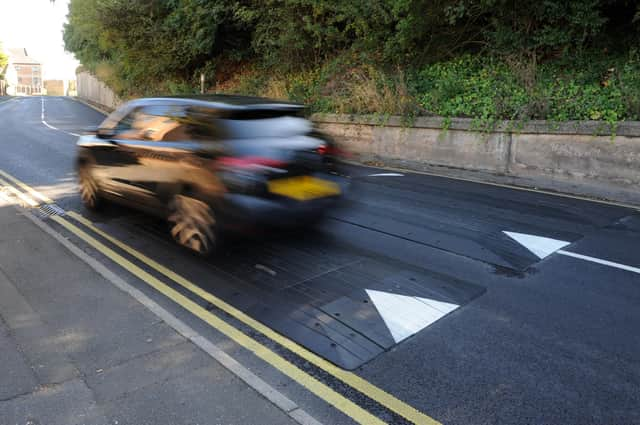Eco-friendly speed bumps made from recycled rubber installed on South Shields roads


Speed bumps made from recycled rubber are being installed as existing traffic-calming measures are replaced in South Shields, which council bosses say are an eco-friendly alternative to the more ‘carbon-intensive’ asphalt road humps.
The new bolt-down cushions have been placed in River Drive, Bents Park Road, Bamburgh Avenue and Lizard Lane.
Advertisement
Hide AdAdvertisement
Hide AdSouth Tyneside Council declared a climate emergency in July 2019 – pledging to take all necessary steps to become a carbon neutral authority by 2030 and also set a three-year target to cut carbon emissions by 4,285 tonnes by March 2023.
Cllr Ernest Gibson, lead member for area management and community safety, said: “As we drive forward our climate change ambitions, we are always looking at innovative new ways of operating, from energy improvements and carbon reduction measures in our buildings to using more sustainable products where we can.
“It is important we review the materials and treatments we use to build and maintain our roads and footpaths and to consider new products that come onto the market.
“This new product is made from recycled materials and is a more sustainable alternative to the bitumen-based cushions, which need to be formed on site and left to cool. It is also more durable, which helps to reduce maintenance costs in the future.”
Advertisement
Hide AdAdvertisement
Hide AdHe added: “As the cushions are prefabricated, they can be simply bolted into place. This makes installation, repairs and replacements quicker and easier, reducing disruption to traffic.
“We have used the new product on roads where traffic calming measures already exist and needed replacing. We will now be looking closely at how it performs on the different road surfaces to determine whether they can be suitably used elsewhere.”
The council is also exploring the potential use of ‘warm mix asphalt’ on its roads. This material is manufactured at a lower temperature than the surfacing material currently used.
The council say using new sustainable products contributes to its climate change ambitions and helps it to deliver on one of its key priorities of investing in the environment.